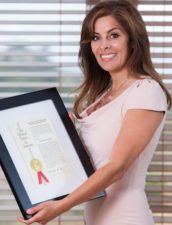Giving up ‘Not an Option’ For Child Farmworker Turned Entrepreneur
Date: May 10, 2017
As the daughter of Mexican immigrants who came to America in 1963, Frances Prado started picking onions in the California fields alongside her parents and six siblings at age 6. At one point, her family was homeless. She remembers sleeping in the trunk of a car. Today, nearly five decades later, Prado calls these experiences blessings. “As I worked cutting roots, the strong smell of onions would fill the air and burn my eyes, but regardless of the extreme heat and harsh working conditions, we had to get the job done,” Prado says. “No matter what, we were taught to persevere because giving up was never an option.”

That steely determination and optimism led Prado to entrepreneurship at age 50 — and, according to her lawyer, to be one of the very few Latino women granted a patent in the United States. On the surface, Prado was the mother of two children who had spent two decades working at Costco. But behind the scenes, she had been developing Hanging Secrets, a bra and lingerie hanger that makes organizing intimate apparel simple while protecting the garment’s shape. Her company launched in 2015, Prado secured angel investment, and, once Hanging Secrets becomes profitable, she plans to donate a percentage of the proceeds to a fund for breast cancer survivors.
Prado is well on her way to success. On the day before her 50th birthday, Hanging Secrets was picked as one of 20 semifinalists in the Home Shopping Network’s “Project American Dreams.” “In January of 2017, we got the opportunity to go to Florida and pitch our product to the executives of HSN . . . and Hanging Secrets was one of the five winners,” she says. For one day, Hanging Secrets and the four other winners had the opportunity to sell their products live on national TV. Today, the product is sold online and at retail boutiques in San Diego.
People like my parents come hungry, and when you are hungry you are going to be productive.
Prado’s success and drive is typical of many immigrants. According to the Information Technology and Innovation Foundation, the foreign-born comprise 36 percent of U.S. patent holders despite making up just 13.5 percent of the U.S. population. It’s little surprise, then, that 20.6 percent of all U.S. entrepreneurs are immigrants, and that foreign-born small-business owners employed 5.9 million Americans in 2007, the last year for which figures are available. “We entrepreneurs and patent-holders generate jobs,” Prado says proudly. “We are contributing and giving back in a positive way to the U.S. economy.”
Prado isn’t even the only entrepreneur in her family. Four of her siblings also founded companies, including businesses offering home-appliance repair and auto-mechanics work. They learned from their mother’s example. When Prado’s mother became a widow at a young age, she sold tamales to help support her seven young children.
Prado, meanwhile, dropped out of school after the 10th grade, married at 16, and had her first child at 21. By 24 she had earned her GED, while working at a food court. She soon moved to a job at a Costco bakery and rose through the ranks.
The idea for Hanging Secrets came in 2009, when Prado’s oldest son was deployed in Afghanistan. Her daughter had recently left for college, and Prado was bereft. She sank into organizing her closet, and quickly realized her lingerie was a mess. It was her “A-ha!” moment. “I stumbled onto the idea,” Prado says. “But creativity is in our bloodline. My mother used to sew underwear for us out of flour bags.”
Prado filed for a non-provisional utility patent — without a lawyer’s help. “It was almost like learning a whole different language,” she says. “But when you don’t have money, you better learn how to figure out how to do it.” With multiple ideas — from apps to automobile accessories — she plans to continue inventing. “The sacrifices that my parents made to come to this country allowed me the opportunity to be an inventor, to be an entrepreneur,” Prado says. “My parents contributed to the U.S. economy, they bought a house, not speaking a word of English, and worked in the fields doing jobs that not everyone can do or likes to do. People like my parents come hungry, and when you are hungry you are going to be productive.”
